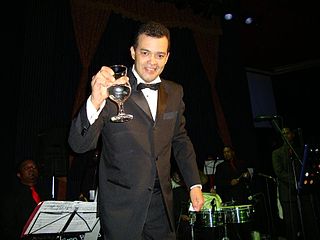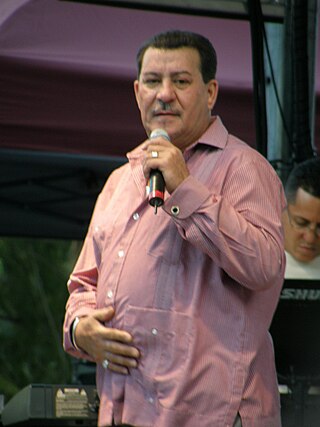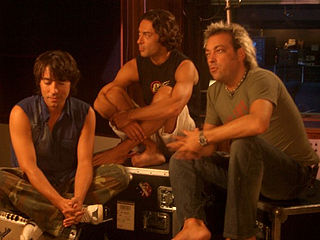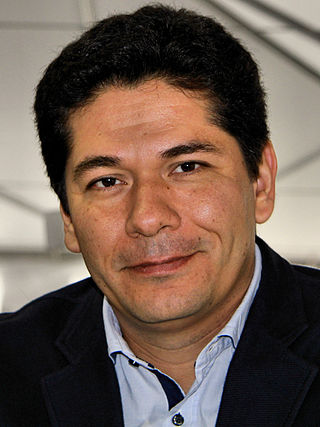Related Research Articles

Alex Bueno, originally born as Alejandro Wigberto Bueno López, is a singer and guitarist from the Dominican Republic, specializing in merengue and bachata music, but also having ties in salsa, bolero, merengue típico, ballad and more. He broke out onto the scene in his early life and has been on the Dominican music scene for over 40 years. Having been an artist for so long, he has amassed a large fanbase in the Dominican Republic.

Julio César "Tito" Rojas López, also known as "El Gallo Salsero", was a Puerto Rican salsa singer and songwriter.

Jaime Bayly Letts is a Peruvian writer, journalist, and television personality.

Bruno Bichir Nájera is a Mexican actor.
Luis Segura, is a popular traditional Dominican singer who refers to himself as 'The Father of Bachata'. He is considered one of the best interpreters of traditional bachata with hits like "Pena por ti", "Dicen", and "No me celes tanto". Segura's first recordings were in the 1960s but it wasn't until his release of "Pena por ti" in the early 1970s that Segura hit stardom.

Belén Ruiz de Gopegui Durán is a Spanish novelist and screenwriter.

Café Quijano is a Spanish pop rock band formed by three brothers, Manuel, Óscar, and Raúl Quijano, all of whom are singers. The brothers are originally from León, along with their father, who ran a musical pub called "La Lola" in the city centre, which gave name to one of their most well-known songs. Apart from publishing four successful albums, they presented galas, collaborated with Disney for soundtracks, and worked on a project with Castilla y León's image to promote tourism to the region.
"El día que me quieras" is an Argentine tango with music by Carlos Gardel and lyrics by Alfredo Le Pera. It is considered one of the most popular songs of the 20th century and one of the best Latin songs of all time. Originally featured in the 1935 film of the same name, sung by Gardel himself, it became a heavily recorded tango standard, even by artists outside of the realm of tango. It has subsequently been covered by various artists such as Luis Miguel, Julio Iglesias, Michael Bolton Roberto Carlos, Raphael de España and Shlomo Idov who translated the song to Hebrew. The song was inducted into the Latin Grammy Hall of Fame in 2001. "El día que me quieras" was honored at the 2014 La Musa Awards as "La Canción de Todos los Tiempos". It was among the tango standards selected by Plácido Domingo for his 1981 album Plácido Domingo Sings Tangos. In addition to Domingo, the song has been covered by operatic tenors including José Carreras, Juan Diego Florez, Christian Ketter, and Alfredo Kraus.

Patricia Conde Galindo is a Spanish actress, comedian, TV presenter and model.

Wendy Guerra, formally Wendy Guerra Torres, is a Cuban poet and novelist, based in Miami.
Leonardo Paniagua is one of the Dominican Republic's most popular bachata musicians. He emerged from obscurity to overnight stardom in the 1970s, when he recorded his first 45rpm record, "Amada, Amante" for Discos Guarachita.
Los Yonic's are a Mexican grupero band formed in 1975.

Pilar Rubio Fernández is a Spanish reporter, TV presenter and model. She became famous for covering events for the program Sé lo que hicisteis... for the television network La Sexta. From January 2010 to January 2013 she was linked to Telecinco, having hosted Operación Triunfo and ¡Más que baile!, besides of being the protagonist of the series Piratas, released in May 2011. Since 2014 has appeared as a collaborator in El Hormiguero. In 2012, she started a relationship with footballer Sergio Ramos, with whom she has four children, they married in 2019.

Soledad Puértolas Villanueva is a Spanish writer, and on 28 January 2010 was named an inmortal or member of the Real Academia Española. She is a recipient of the Premio Planeta de Novela.

Juan Pablo Villalobos is a Mexican author.

The 13th Annual Latin Grammy Awards was held on Thursday, November 15, 2012 at the Mandalay Bay Events Center in Las Vegas, Nevada. It was the fifth time the awards was held at this venue and in Las Vegas. It also marks the last year in the Latin Recording Academy's contract where the Mandalay Bay Events Center hosted. It is unknown if the awards will continue to be held at this location beyond 2012.

Mariana Enríquez is an Argentine journalist, novelist, and short story writer. She is a part of the group of writers known as "new Argentine narrative". Her short stories fall within the horror and gothic genres, and have been published in international magazines such as Granta, Electric Literature, Asymptote, McSweeney's, Virginia Quarterly Review and The New Yorker.
Grupo Yndio is a Mexican band from Sonora founded in 1972, by some of the members of the dissolute Los Pulpos.

Anagrama is a Spanish publisher founded in 1969 by Jorge Herralde. In 2010, it was sold to the Italian publisher Feltrinelli.

Jordi Amat Fusté is a Spanish essayist, philologist, editor and cultural critic, expert in the 20th-century intellectual history of Catalonia and the rest of Spain. He writes in both the Catalan and Spanish languages.
References
- 1 2 Frouchtmann, Juan S. (7 November 2003). "Kiko Amat: Mis discos y yo" [Kiko Amat: My Records and Me]. El Mundo La Luna (in Spanish). Retrieved 5 December 2018.
- ↑ Santos, Care (23 October 2003). "El día que me vaya no se lo diré a nadie". El Cultural (in Spanish). Retrieved 5 December 2018.
- ↑ Hevia, Elena (25 January 2009). "Kiko Amat: 'Los amigos te salvan en la adolescencia'" [Kiko Amat: 'Friends Save You in Adolescence']. El Periódico de Catalunya (in Spanish). Barcelona. Retrieved 5 December 2018.
- 1 2 Hevia, Elena (10 April 2007). "Jóvenes escritores españoles se zambullen en la cultura pop" [Young Spanish Writers Plunge Into Pop Culture]. El Periódico de Catalunya (in Spanish). Barcelona. Retrieved 5 December 2018.
- ↑ Bravo, Mario (23 August 2007). "Entrevista a Kiko Amat: Literatura desde las aceras" [Interview with Kiko Amat: Literature from the Sidewalks]. Diagonal (in Spanish). Retrieved 5 December 2018– via Rebelión.
- ↑ "Edición 2010". Mandarache Award. Archived from the original on 21 March 2018. Retrieved 5 December 2018.